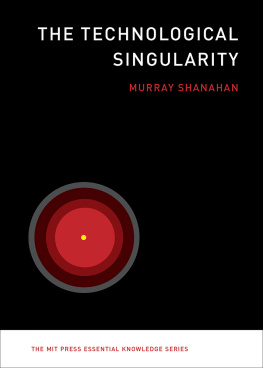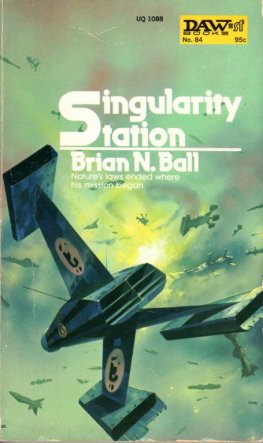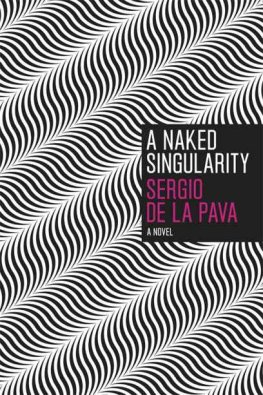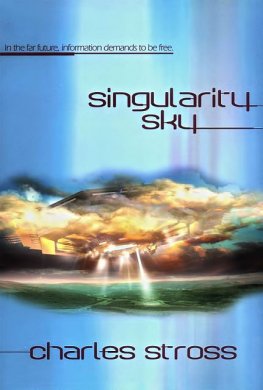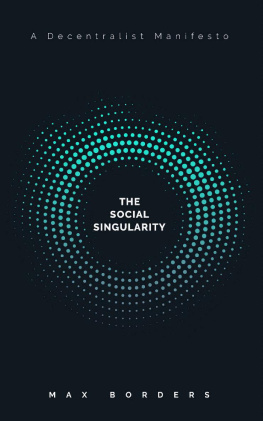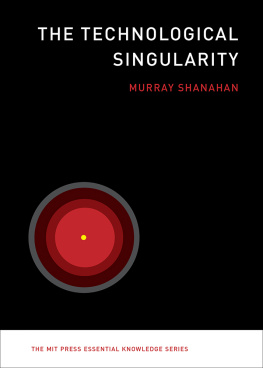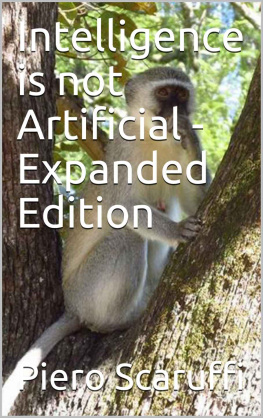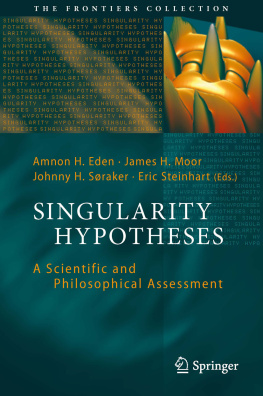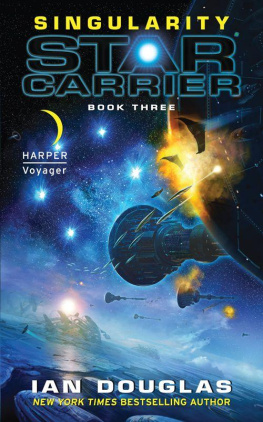The Technological Singularity
The MIT Press Essential Knowledge Series
Understanding Beliefs, Nils J. Nilsson
Computing: A Concise History, Paul E. Ceruzzi
The Conscious Mind, Zoltan L. Torey
Crowdsourcing, Daren C. Brabham
Free Will, Mark Balaguer
Information and the Modern Corporation, James W. Cortada
Intellectual Property Strategy, John Palfrey
The Internet of Things, Samuel Greengard
Memes in Digital Culture, Limor Shifman
MOOCs, Jonathan Haber
Open Access, Peter Suber
Paradox, Margaret Cuonzo
Waves, Frederic Raichlen
The Technological Singularity, Murray Shanahan
The Technological Singularity
Murray Shanahan
The MIT Press
Cambridge, Massachusetts
London, England
2015 Massachusetts Institute of Technology
All rights reserved. No part of this book may be reproduced in any form by any electronic or mechanical means (including photocopying, recording, or information storage and retrieval) without permission in writing from the publisher.
Library of Congress Cataloging-in-Publication Data
Shanahan, Murray.
The technological singularity / Murray Shanahan.
p. cm.
Includes bibliographical references and index.
ISBN 978-0-262-52780-4 (pbk. : alk. paper) 1. Artificial intelligenceForecasting. 2. Artificial intelligencePsychological aspects. 3. TechnologySocial aspects. 4. Conscious automata. 5. BrainComputer simulation. I. Title.
ISBN 978-0-262-33183-8 (retail e-book)
Q335.S4626 2015
006.3dc23
2015000997
These remarks might appear fanciful to some readers, but to the writer they seem very real and urgent, and worthy of emphasis outside of science fiction.
I. J.Good, Speculations Concerning the First Ultraintelligent Machine (1965)
Real motive problem, with an AI. Not human, see?
William Gibson, Neuromancer (1984)
Series Foreword
The MIT Press Essential Knowledge series offers accessible, concise, beautifully produced pocket-size books on topics of current interest. Written by leading thinkers, the books in this series deliver expert overviews of subjects that range from the cultural and the historical to the scientific and the technical.
In todays era of instant information gratification, we have ready access to opinions, rationalizations, and superficial descriptions. Much harder to come by is the foundational knowledge that informs a principled understanding of the world. Essential Knowledge books fill that need. Synthesizing specialized subject matter for nonspecialists and engaging critical topics through fundamentals, each of these compact volumes offers readers a point of access to complex ideas.
Bruce Tidor
Professor of Biological Engineering and Computer Science
Massachusetts Institute of Technology
Preface
Like many others who have dedicated their working lives to research in artificial intelligence, I was inspired as a child by science fiction. My boyhood hero was not a real person. It was Susan Calvin, the scientist in Asimovs I Robot stories (the written works, not the film) who pioneered the field of robot psychology. More than anyone else, I wanted to be like her when I grew up. Now that I have (sort of) grown up, and in real life bear the title of Professor of Cognitive Robotics, I have a more complex relationship with science fiction. I still see it as a source of inspiration and as a medium for exploring important philosophical ideas. However, the ideas it explores merit a deeper treatment. The primary purpose of science fiction is to entertain, albeit in an intellectually stimulating way. It would be a mistake to use it as a guide to thinking.
So this is not intended as a work of science fiction. Nor is it a piece of so-called futurology. The aim here is not to make predictions. Rather, it is to investigate a range of possible future scenarios, without committing to the prospect of any one in particular, and without any particular timescale in mind. Indeed even highly unlikely or remote scenarios are sometimes worthy of study. This is true, for instance, if a scenario is especially dystopian. In that case we might want to think carefully about how to reduce its likelihood even further. Unlikely or remote scenarios are also worth discussing if they raise interesting philosophical questions, obliging us, for example, to think about what we really want as a species. So whether or not you think we will soon create human-level artificial intelligence, whether or not you think the singularity is near, the very idea deserves some serious thought.
This is a short book on a very large theme. So it can only stand as an introduction, with many important issues given only a brief treatment. For example, various arguments relating to consciousness are presented to which there are well-known counterarguments, and these merit counterarguments of their own. But an introductory book has to skip over these subtleties. Also the focus is heavily on the future of artificial intelligence, and some significant related topics, such as nanotechnology and biotechnology, are barely touched on. The book is intended to provide a neutral overview of the conceptual territory, and I have attempted to outline both sides of the argument in controversial matters. However, it seems unavoidable that some of my own views will be visible through the veil of neutrality, despite my best efforts.
I would like to thank the very many people who have discussed artificial intelligence with me over the decades, not only academics and students but also members of the public who have attended my talks. I would like to thank them all by name, but that would be impossible. So I will reserve my explicit gratitude for a few colleagues whose recent influence has been especially pertinent. Thanks to Stuart Armstrong, Nick Bostrom, Andrew Davison, Daniel Dewey, Randal Koene, Richard Newcombe, Owen Holland, Huw Price, Stuart Russell, Anders Sandberg, and Jaan Tallinn. Sorry to those I have forgotten. Finally, I would like to thank MIT Press, and especially Bob Prior, for encouraging me to write the book in the first place.
Murray Shanahan
North Norfolk and South Kensington, October 2014
Introduction
In recent years the idea that human history is approaching a singularity thanks to increasingly rapid technological advance has moved from the realm of science fiction into the sphere of serious debate. In physics, a singularity is a point in space or time, such as the center of a black hole or the instant of the Big Bang, where mathematics breaks down and our capacity for comprehension along with it. By analogy, a singularity in human history would occur if exponential technological progress brought about such dramatic change that human affairs as we understand them today came to an end. The institutions we take for grantedthe economy, the government, the law, the statethese would not survive in their present form. The most basic human valuesthe sanctity of life, the pursuit of happiness, the freedom to choosethese would be superseded. Our very understanding of what it means to be humanto be an individual, to be alive, to be conscious, to be part of the social orderall this would be thrown into question, not by detached philosophical reflection, but through force of circumstances, real and present.
What kind of technological progress could possibly bring about such upheaval? The hypothesis we will examine in this book is that a technological singularity of this sort could be precipitated by significant advances in either (or both) of two related fields: artificial intelligence (AI) and neurotechnology. Already we know how to tinker with the stuff of life, with genes and DNA. The ramifications of biotechnology are large enough, but they are dwarfed by the potential ramifications of learning how to engineer the stuff of mind.
Next page
